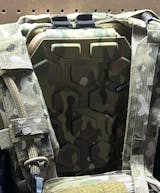Concealed Carry: The Benefit of Asking “What If?” Before a Potential Use of Force Situation - Part II

The following article is by one of our longtime customers, Gunnar Anderson. Enjoy!
- Justin
///START GUEST ARTICLE///
What should I do? Is his firearm loaded? Am I in danger? Should I run? Should I fight? A previous article covered how questions like these need to be asked and answered in literally no more than a second or two. Other articles showed how you can benefit by asking “what if?” before that critical moment of deciding whether to use deadly force and what happens after you are involved in a use of force incident. Here is another scenario based on an experience of mine. What would you do and why?

You are at the local gun store buying reloading supplies but the store is packed with people panic-buying ahead of another presidential election. You are waiting for a sales associate to help you when you see a dad with his ten-year-old daughter standing roughly thirty feet away. He picks up a rifle from the rack of used firearms, calmly cycles the bolt and aims it at your head while looking through the scope. You yourself are carrying a concealed firearm. What do you do? Why?
- You draw your concealed firearm and use deadly force to defend yourself. After all, he pointed a firearm at your head.
- You draw your concealed firearm, point it at the man and, using command presence, instruct him to put down the firearm. He pointed a gun at you first, and you plan on effectuating a citizen’s arrest.
- You leave your firearm holstered and concealed, but you use your command presence to instruct the man to put down the firearm. Based on the situation, you conclude that it is highly unlikely that the bolt action rifle is loaded - even if he just violated several rules of firearm safety.
- You seek cover behind the shelving near where you are standing and move out of the potential line of fire. You are unsure about whether the state has a stand your ground law and do not want to risk the parade of horribles covered in a previous article describing what happens after you are involved in a use of force incident.
If you chose either of the first two options, why? Did you reasonably think that the man had calmly loaded the firearm in front of his daughter and planned on shooting you? Did you reasonably think that he had defeated the trigger lock on the used rifle? Even if you did not shoot the other person, did you consider that someone else in the gun shop might draw on and shoot you? Stated differently, did you really need to introduce another firearm into the fact pattern.
If you chose the third option, why? Even though the odds that the rifle was loaded are very much in your favor, do you not think it was reckless to take that risk?
When this scenario happened to me, I went with option three. It had been a long day, and I was not in the mood to either shoot someone or run for cover, even if seeking cover was the safest course of action. I considered the fact that the used rifle had a trigger lock and thought it unlikely that the man was planning on committing murder in front of his ten-year-old daughter. I did however make a scene. I loudly called out to the man and instructed him to not point a rifle at me. Everyone in the store stopped and looked at us. (As an aside, shame on the sales associates for not stepping in at any point of this story.) The man stammered about the rifle not being loaded but quickly exited the store with his daughter - presumably understanding that he had committed a number of sins while handling the firearm.
I shared this story with Justin Li, who is now the Co-Founder and CEO of Qore Performance, the next day. At the time of this incident, he was a licensed peace officer. His response was something along the lines of, “Did you point a gun back at him? I’m pretty sure you get to do that when someone points a gun at you first.” I laughed and agreed in principle but said that I did not want to get handcuffed while law enforcement determined what happened.
I now share these events with you so that you can ask yourself “what if?” You can ask yourself this question after reading these articles, watching the news or discussing hypotheticals with your friends. By asking yourself this question in advance, maybe you can make a better decision when you need to choose whether to use force.
Gunnar Anderson is a former EMT, rescue diver, and prosecutor who now trains and advises both law enforcement and emergency management. Nothing in this article should be construed as legal advice - it is meant to encourage discussion and thoughtful planning.
///END GUEST ARTICLE///






Leave a comment